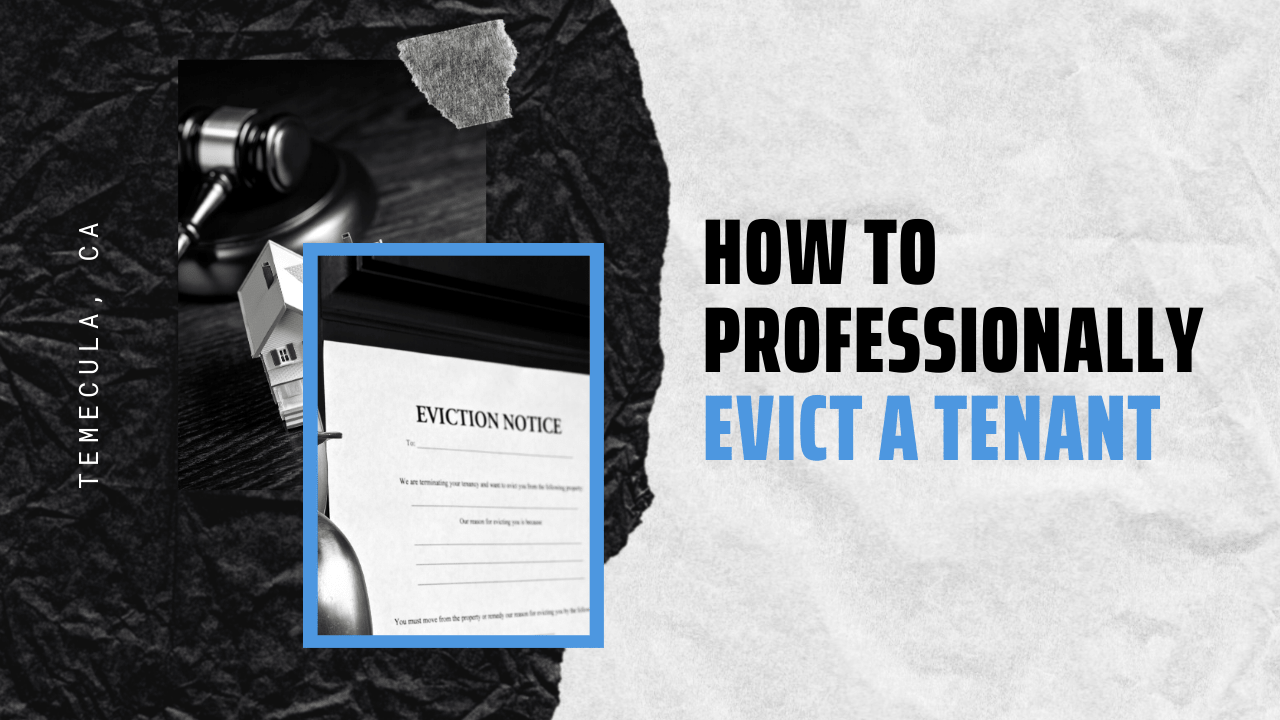
Evicting a tenant in California has always been complicated, but with the eviction moratoriums in place due to the COVID pandemic as well as the new tenant protections in place, removing a tenant from your property is now more complex than it was even a year ago.
Things are still uncertain in terms of the eviction ban that was put into place back in March. Many tenants are finding themselves unable to pay rent because of economic hardships they’ve faced, and a lot of landlords have been willing to work with those tenants. However, rent has to start coming in consistently again at some point, otherwise property owners are going to suffer even more than they already are.
If you need to evict a tenant in Temecula, we strongly urge you to talk to a professional property manager or an attorney. This is a fluid situation that is changing almost daily. We are sharing the general principles that are normally involved in the professional eviction of a tenant, but we’re also reminding you that things aren’t exactly normal right now – and we really don’t know when they will be.
Eviction Moratorium and COVID
A moratorium on evictions in California was put into place on March 4. The governor declared a state of emergency and mandated that no evictions could occur during that state of emergency. Landlords were notified that they would not be able to evict for a full 90 days after that state of emergency was lifted.
As of right now, we’re still under the eviction ban and we’re not sure when it will be lifted.
This moratorium (which has recently been extended to last through February 2021) does not forgive rental payments nor release tenants from their contractual obligations in the lease agreement, but it does prevent landlords from evicting tenants until the courts are ready to accept those filings again.
While most eviction and foreclosure court proceedings in the state have been suspended since March, the order from the Judicial Council is being challenged as unconstitutional. It’s possible evictions can and will resume in the next few weeks. But, even as you become able to file for eviction again, you may find there’s a long waiting list at the courthouse.
Be prepared to spend extra time on your eviction.
Just Cause vs. No Cause Evictions in California
Most evictions are done due to nonpayment of rent. If this is your reason for evicting a tenant, it’s considered a just cause eviction, and you have to follow a specific process before you get back possession of your property. Other just causes for evicting a tenant include lease violations and criminal activity.
If you want to evict a tenant simply because you want to do something else with the property, you may have to pay a relocation fee. All of this depends on the type of property you own, so make sure you check with an attorney or a Temecula property management company before taking steps to remove a tenant from your property.
Eviction Process: Serve a Three Day Notice to Pay or Quit
When rent isn’t paid and any grace periods have expired, you will start the eviction process with a Three Day Notice to Pay or Quit. This is a formal letter that you serve your tenants to let them know that rent is late and they have three days to catch up. If your tenants do not pay rent within those three days, they must move out of the property or face further eviction proceedings.
Usually, you can expect your tenants to catch up with the rental payment at this point because they won’t want the situation to escalate. You may be asked if they can make a partial payment or pay a few days or a week from the date of the notice. How you handle this depends on whether you’re eager to get the tenant out or you’re hoping to keep the tenant in place and ultimately collect the payment. If you do agree to a payment arrangement, put it in writing and move forward with the eviction process if the tenant does not come through.
Filing an Unlawful Detainer
 After the notice period expires, if the tenant has neither paid rent nor moved out of the property, you’ll need to go to court and file for an Unlawful Detainer. This is the official eviction, and you’ll have to fill out some paperwork, pay a fee, and wait for the court date to be assigned. Your tenant will receive a Summons.
After the notice period expires, if the tenant has neither paid rent nor moved out of the property, you’ll need to go to court and file for an Unlawful Detainer. This is the official eviction, and you’ll have to fill out some paperwork, pay a fee, and wait for the court date to be assigned. Your tenant will receive a Summons.
Most judges will ask you and the tenant to try to resolve the problem before the court date. Sometimes, tenants won’t respond to the Summons or show up in court at all. If you’re able to prove that your tenant is in violation of the lease, you’ll get a Writ of Possession. The tenant will have a deadline to move out and if they don’t move out, the sheriff will enforce that Writ of Possession.
Eviction is never fun, and in California it is extremely complicated, especially now.
Our advice is to try to work with your tenants. See if there’s a way to put together payment arrangements or to cancel the lease agreement, if they can’t pay and are willing to move out of the property. Don’t take steps that may be illegal or improper. Contact us at Management One Professionals. We can help with your eviction needs and with all of your Temecula property management questions.
Management One Professionals provides single-family and condo landlords, rental property owners and real estate investors expert property management services throughout the Temecula Valley, including Temecula, Murrieta, Winchester, Wildomar, Menifee, and Lake Elsinore, and other surrounding cities.
















